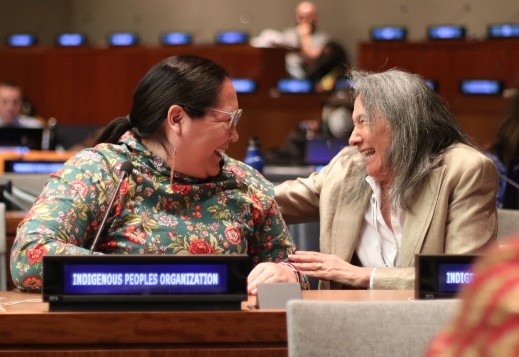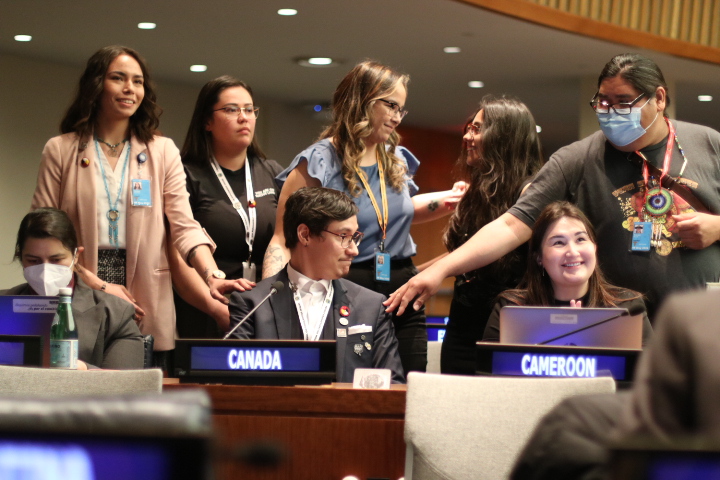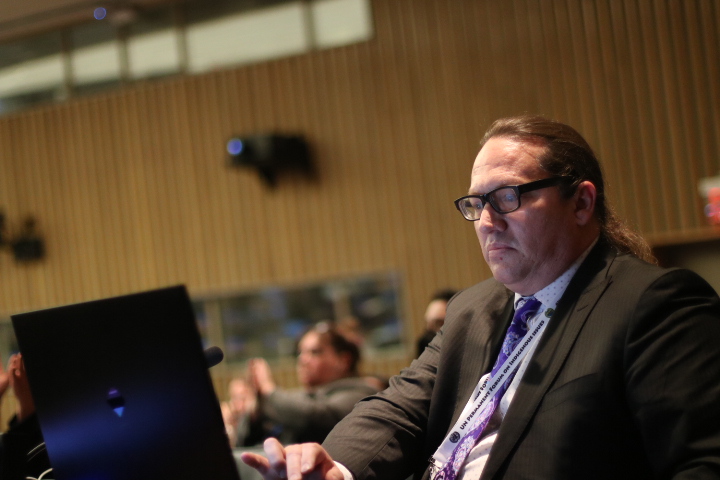
- Details
- By Jenna Kunze
NEW YORK — Native News Online listened to comments made during the United Nations Permanent Forum on Indigenous Issues Friday afternoon forum. Among the comments, a common theme was the abject failure of the U.S. and Canada to stop their official actions that destroy Indigenous languages and cultures.
Nunavut calls for Inuktitut to be recognized as an official language
On the floor of the United Nations Permanent Forum on Friday, Aluki Kotierk (Inuk from Nunavut), president of Nunavut Tunngavik Incorporated, asked the permanent forum to intervene in Canada’s failure to address systemic discrimination in education.
In Canada’s Arctic Archipelago, Nunavut is the only jurisdiction of the country where the predominant language spoken is neither French nor English. Yet the government of Nunavut’s changes to Inuit language legislation in 2020 effectively reduced instruction in Inuktut by limiting the language instruction across all subject areas and grade levels to one elective language course.
“This is linguicide,” Kotierk said in impassioned testimony on Friday afternoon. “I call upon the Government of Canada to recognize Inuktut as an official and founding language of Canada and Nunavut.”
In Oct 2021, Nunavut Tunngavik Incorporated launched a case asserting the rights of Inuk students to receive equal treatment in education in their language. But earlier this month, the Government of Nunavut filed a motion to dismiss the case— “alleging that the only language education rights in Canada belong to English and French speaking people under the charter, and that Inuit do not have a right to language within education.”
“To date, over 70% of Inuit youth are dropping out of school, or rather, being pushed out due to a formal education system that is based on a foreign language and a foreign culture,” Kotierk said. “Inuit students who make 94% of the student population are denied equal opportunity to education in our own language and culture…. Inuit expect and deserve better.”
 Members of the Young Diplomats of Canada congratulate Nipawi Kakinoosit (center) for his testimony on their behalf on Friday afternoon. (Photo/Jenna Kunze)
Members of the Young Diplomats of Canada congratulate Nipawi Kakinoosit (center) for his testimony on their behalf on Friday afternoon. (Photo/Jenna Kunze)
Young Diplomats of Canada call for Youth Advisory Council
Nipawi Kakinoosit (Sucker Creek First Nation and Treaty 8 Hereditary Chief)—backed by fellow delegates with the Young Diplomats of Canada—emphasized the importance of youth in the Permanent Forum.
Kakinoosit asked the Permanent Forum to consider three asks from the Young Diplomats, which were interrupted by applause from delegates on the floor.
Those asks included: the creation of a Youth Advisory Council that would report to the main body; the opportunity for a youth report to be completed on a yearly basis to reflect on the reports and provide recommendations for consideration by the main body that; and to task the Youth Advisory Council with youth engagement, data collection, and participation in their respective regions to advocate on behalf of indigenous youth interests and perspectives.
“Through the creation of a Youth Advisory Council, we feel that human voices and indigenous youth worldwide will finally have a space to help build a future.”
 Chief Ben Barnes of the Shawnee Nation prepares for his statement on Friday afternoon. (Photo/Jenna Kunze)
Chief Ben Barnes of the Shawnee Nation prepares for his statement on Friday afternoon. (Photo/Jenna Kunze)
Shawnee Nation Chief Ben Barnes calls for special rapporteur on Boarding School
At his first visit to the United Nations Permanent Forum on Idigenous Issues, Chief Ben Barnes asked the Permanent Forum to assign a Special Rapporteur to study the impacts of boarding schools and reeducation camps that have harmed Indigenous peoples across the board.
“The Shawnee feel compelled to speak as world governments have not committed enough effort to encourage truth-telling and reconciliation,” Barnes said in his three-minute statement Friday afternoon. “It is with this urgency, we call upon the Office of the High Commissioner for Human Rights to assign a Special Rapporteur to monitor, document, and provide a report to the Permanent Forum on status of remedy and consultation between member states and Indigenous peoples. The Shawnee repeats the call for the members of the Permanent Forum to consider a new focal point on reeducation camps and schools.”
Barnes told Native News Online before his statement this afternoon that the “ruinous effects” of forced coercion or collusion to assimilate Indigenous peoples into the dominant society deserve a deeper look: “Where is it ongoing here today? How many dollars did we spend to take away our cultures, languages, and religion?”
Barnes said that, in light of the United Nations Decade of Indigenous Languages dedicated to revitalizing and preserving Native languages, it would be wise to take a closer look at the institutions that stripped Native peoples from their languages.
“Are boarding schools not the root cause of all of this? Are boarding schools not the root cause of the erosion of our sovereignty and our cultures?”
Oglala Lakota Youth calls for the end of mining in the Black Hills
Anpo Jensen (Oglala Lakota) spoke for the second time on Friday afternoon, connecting past and present mining in the Black Hills to disporportionately high suicide rates among Oglala Lakota youth on the Pine Ridge Indian Reservation.
Currently in the Black Hills, there are 13 pending patents for gold and uranium mining, Jensen said.
“The legacy of gold mining carried out without our consent and a violation of our 1868 Fort Laramie Treaty has led to the contamination of our waters by mercury. Mercury is a neurotoxin with irreversible impacts on our babies. It also causes chronic fatigue syndrome, which mimics the effects of depression,” Jensen reported to the UN Permanent Forum. “On the Pine Ridge Indian Reservation, the suicide rate is 150 percent higher than for the United States population, which we believe is tied to this contamination. Or health will only improve if mining stops.”
More Stories Like This
Native News Weekly (August 25, 2024): D.C. BriefsUS Presidents in Their Own Words Concerning American Indians
Merry Christmas 2025
Navajo Man Faces Vehicular Homicide Charge After Child Killed at Navajo Nation Christmas Parade
Next on Native Bidaské: Lumbee Tribal Chairman John Lowery
Help us defend tribal sovereignty.
At Native News Online, our mission is rooted in telling the stories that strengthen sovereignty and uplift Indigenous voices — not just at year’s end, but every single day.
Because of your generosity last year, we were able to keep our reporters on the ground in tribal communities, at national gatherings and in the halls of Congress — covering the issues that matter most to Indian Country: sovereignty, culture, education, health and economic opportunity.
That support sustained us through a tough year in 2025. Now, as we look to the year ahead, we need your help right now to ensure warrior journalism remains strong — reporting that defends tribal sovereignty, amplifies Native truth, and holds power accountable.
 The stakes couldn't be higher. Your support keeps Native voices heard, Native stories told and Native sovereignty defended.
The stakes couldn't be higher. Your support keeps Native voices heard, Native stories told and Native sovereignty defended.
Stand with Warrior Journalism today.
Levi Rickert (Potawatomi), Editor & Publisher

